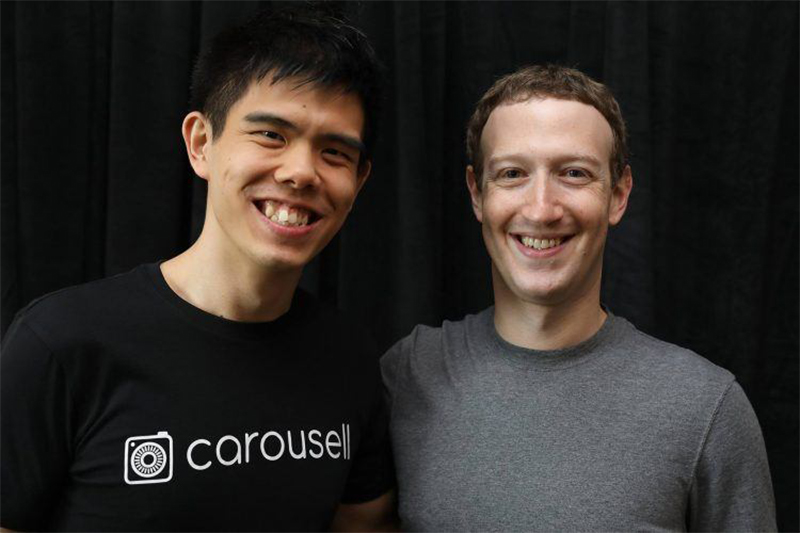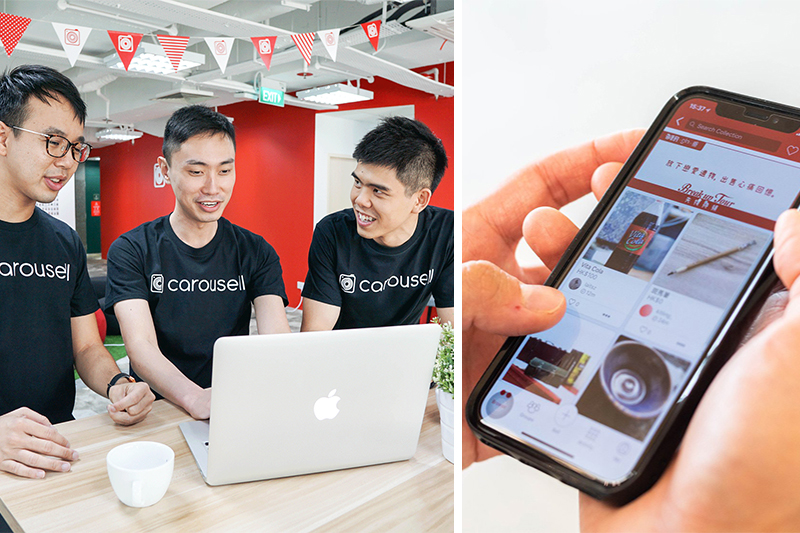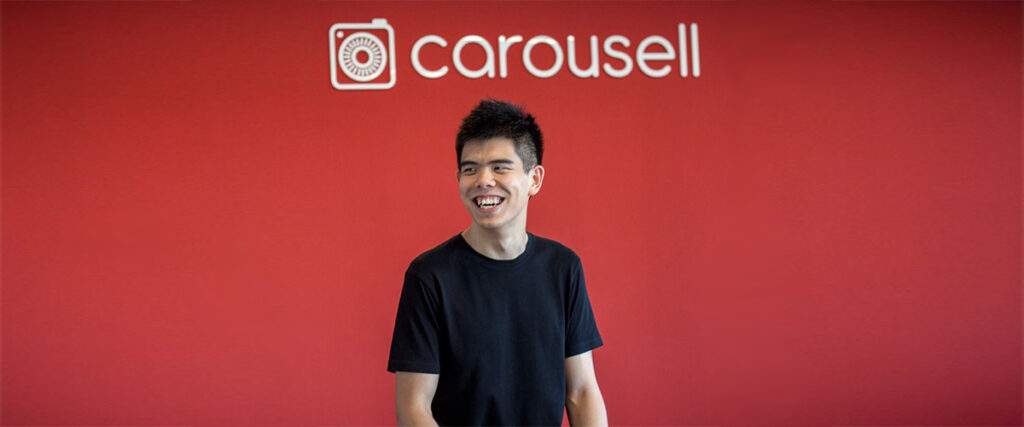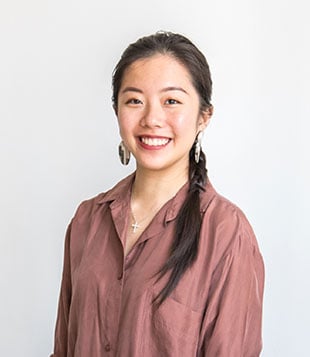Siu Rui Quek, the 30-year-old co-founder of Asia’s leading marketplace app Carousell, reveals to us how he went from selling his old gadgets to building a mobile-based flea market that worth millions.
If you’re a person who keeps a bunch of junk, you need Carousell – one of the largest mobile-based marketplaces created to make your shopping life so much easier and more meaningful, by encouraging the trading of preloved goods. With its simplified listing features, the e-commerce app has now facilitated more than 50 million successful transactions, at a rate of over 140 items sold per minute. To date, it has racked up USD 126.8 million of funding with the endorsement of multinational banks and venture capital investors such as DBS and Sequoia Capital. The brains behind this Singapore startup, situated in the heart of Singapore where the Hive Carpenter is located, are three self-proclaimed tech geeks, one of which is Siu Rui, the co-founder and CEO of Carousell, who shares with us how he and his team spin the student-designed app into a multi-million business in the short six years time since its debut.

The story began in Silicon Valley when Siu Rui and his friend Marcus Tan met their new housemate Lucas Ngoo during a school exchange program in 2011. Soon the three discovered that they actually had a lot more in common than simply their education at the prestigious National University of Singapore and Stanford University. A year spent in the epicentre of tech innovation had not only given Siu Rui his first taste of startups, but it also pushed him to ponder on the impact technology can make. Sparked with entrepreneurial curiosity, he and his like-minded peers started Carousell to address the one question that bothered them most – how to get rid of unwanted but well-functioned gadgets without having to hassle with the complicated procedure of listing things for sale online.
So in May 2012, dropping out of his Honours year, Siu Rui took the plunge and co-founded the app, which features are tailor-made to address the aforementioned frustration. “All three of us were self-taught, so it took us three months with our heads down to build the very first version of Carousell,” Siu Rui recalls. “Our prototype made use of the smartphone features that people were already familiar with to streamline the process of online trading, making it as easy as taking photos and texting,” Siu Rui elaborates. With Carousell, it takes only three steps (snap, list, sell) for sellers to post a listing, which can be done within 30 seconds. Sellers and buyers are able to negotiate and deal through its in-app chat system instead of emailing back and forth. The entire process is swift and straightforward, much like how you use Instagram and Whatsapp.
But the boys have a grander vision than just creating a platform where people trade for extra bucks. “Unlike the regular e-commerce sites where people buy brand-new items, Carousell is laser-focused on the mission to inspire everyone to start selling their impulse buys or pre-loved items that resulted from online shopping sprees,” explains Siu Rui. Rather than having to find a place to stash your heaps of preloved items that come with the habit of overconsumption, you can pass them around to those who need them on Carousell. “It is one of the largest classified apps through which we can help individuals declutter, so they can make spaces for more meaningful things and experiences in their lives,” says Siu Rui. For the same reason, they turned down a US$100 million acquisition offer earlier on this year. “We were grateful for the offer, but this is our once-in-a-lifetime opportunity to help change consumption behaviour. We are less than 1% done, we can’t give it away.”

With the firm commitment to tackling the global issue of overconsumption, Carousell continues to go from strength to strength under the leadership of Siu Rui and his partners. Since the official launch of Carousell in August 2012, the three boy team has fast grown into a USD 500 million worth classified platform with over 200 full-time global employees. It has established a far-reaching presence in seven markets around the Asia-Pacific Regions, including Hong Kong, Singapore, Taiwan and Australia. From second-hand cars, furniture, to unused gadgets and fashion items, the platform boasts over 144 million listings, all of which are meticulously sorted into categories, making Carousell less like an app, and more like a beautiful shopping catalogue.
With studies forecasting a rapid upward trajectory in the online market in Southeast Asia, where regional online spending is predicted to skyrocket from USD 10.5 billion in 2015 to USD 32 billion by 2020, the e-commerce ecosystem has never been more robust. As Siu Rui himself reckons, a boom in consumption due to the emergence of new economies and growing affluence in the region has created favourable conditions for startups such as Carousell to achieve success. But apart from this is startups’ capability to adjust to social and technological changes in light of which Carousell positions itself as a mobile-first marketplace. “In Southeast Asia, many people are experiencing the internet for the first time through their smartphones,” Siu Rui continues, “given this trend, Carousell reimagines the way transactions are made on cell phones to reach out to this smartphone generation of internet users who leapfrogged the desktop internet.”
While the number of e-commerce alternatives may be growing, undaunted by the keen competition amongst other formidable players and ambitious newcomers, Carousell remains as Asia’s dominant mobile marketplace. Siu Rui pinpoints that the key to continue staying ahead of the curve is by innovating and enhancing the Carousell experience for users of different geographies. “As a startup based in Singapore, we are surrounded by differences, and we knew that we had to go local to be global,” Siu Rui elucidates. “We have local teams in all our markets, to ensure that everything we do is relevant and resonates with our users in that country.” An illustration of such would be the suggested replies in the in-app chat system, which is provided based on local language use. That also explains why Singlish and Cantonese are adopted in the app’s Singapore and Hong Kong version respectively.
In June 2018, Carousell rolled out its latest in-app payment system CarouPay in partnership with leading financial institution DBS, Strip and Visa. Carousellers can now pay directly within the app using DBS PayLah!, credit or debit cards, instead of having to arrange payments on their own outside the app, which would reduce the transaction time by half. Since CarouPay holds onto funds until buyers have received the expected item, it gives both sellers and buyers a layer of protection, minimising their risk of running into scammers. The latest feature is part of Carousell’s efforts to reduce friction during transactions and ultimately, to enable their users to trade their underused items hassle-free with cashless convenience. The function is currently available for users in Singapore and will extend its reach to other markets in the near future.
At the moment, Siu Rui and his team are working towards bettering the incorporation of AI and Machine Learning technologies in the app to create a more personalised experience, which includes the personalisation of the app’s homepage according to users preference, contents filtration to create a safer trading environment, and provision of a more personalised suggested replies in the in-app chat. Ultimately, the Carousell team hopes to spearhead a new revolution in the online marketplace. “We see AI as the new frontier for the classifieds sector, or Classifieds 4.0, so we plan to continue investing our resources in technology and building a world-class team to realise this vision,” says Siu Rui. “It’s our goal to augment the marketplace with smarter AI features to the overall user experience for our community.”
Having recently made it to Forbes’s 30 under 30 Asia list, Siu Rui gives his last but not the least important piece of advice for those who have a burning desire to kick-start an entrepreneurial journey. “Start with identifying a problem you feel strongly about solving,” says Siu Rui. “There are tons of challenges you’ll have to go through daily in a startup. For us, for example, was to get downloads in the earliest days. But the only reason why you’ll keep persevering and pressing on is that you have that absolute passion for what you do.”





